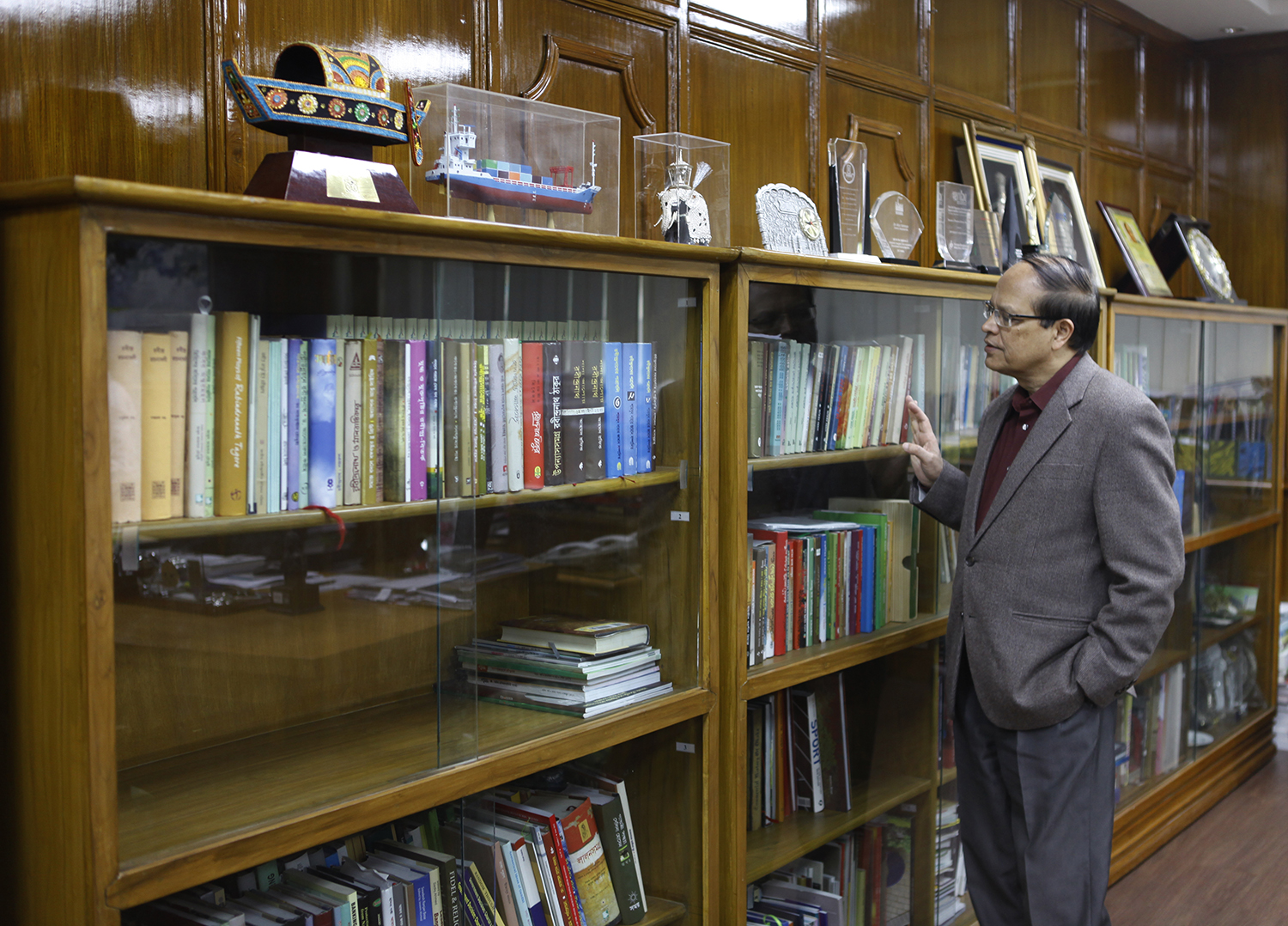Bangladesh Top-Performing Asian Economy in Covid Pandemic
Being deemed a bottomless basket is now a compliment. The case of Bangladesh exhibits how being referred to a nation that had a bleak future, does not mean one cannot change their future. COLORS Business’ Advisory Editor Ziaul Karim and Assistant Editor Arka Dev Biswas sits with Dr. Atiur Rahman, the former Governor of Bangladesh Bank on what Bangladesh is doing right.

Primary Sector Strength
Newly formed nations must start from somewhere. Dr. Atiur Rahman believes that the foundations for Bangladesh were laid prior to foreseeing the current growth trends. “The pillars were set from the get-go by the Father of the Nation.” The factors that have contributed to Bangladesh’s sustained growth can be attributed to the policies that were placed initially. The first policy that was established was to ensure that Bangladesh was food sufficient. Empowering the agricultural sector through curbing imports. “A joint strategy that targeted to produce ample supply of food, as well as controlling population was jointly used to ensure food sufficiency,” Dr. Rahman identifies. Along with this, the right to education through nationalizing primary education and establishing secularism in the State allowed them to create the proper base for the nation. These principles allowed the growth of both public and private institutes. “The mixed economy aims to serve the majority. Both public and private sectors do have their own pros and cons, however, the idea is to maximize services to the people.” The skewed nature of capitalists always has its challengers but having private institutes functioning creates the competition to improve services in the economy.
Dr. Rahman sees the agricultural sector and the agro-industry integral to Bangladesh’s sustained growth. “The macro-economic strength gained on the back of the agricultural industry is something we have kept going. Even today the contributions of the agro sector are prevalent, and we must enable it further.” With beaming pride, Bangladesh earnt more than 24.8 billion USD from remittances in the fiscal year 2020-21. This catalyzes the growth potential of Bangladesh, by enabling rural areas in gain from the positive spillover of growth. Rural areas have more access to finance, resources, and greater expenditure. However, this has a slippery-slope argument to it. Increased growth has resulted in increased cost of living, relative to what it used to be, tightening the rural economy than it was. “The reverse migration has improved employment in rural areas and allowed institutions to be built in rural areas as well. This means you would see urban facilities being present in rural areas as well.” Dr. Rahman sees these changes having an overall positive effect on the economy as production increases for rural areas.

Participation of workforce
The participation of the labor force is important for any economy to increase its output. “The participation of women significantly contributed to Bangladesh’s economy. The formal sector and modernization of industries has been possible due to the participation of more individuals, especially women.” The policies implemented have empowered and enabled greater participation, as per Dr. Rahman. Improved skill remuneration, compliance in the manufacturing sector, industrial goods consumption, changes in lifestyle and demand in goods and services are a result of improved policy implementation participation. The increase in participation from 38% to 40% over time, is a significant jump for rural areas as these empowered women hailing from rural areas. Skill being valued and being compensated for the effort allowed increased growth for rural individuals.
Agro Priority
To further accelerate the GDP of Bangladesh, the country must prioritize its agricultural industry, which is what Dr. Rahman believes. The notion stems from the fact that Bangladesh’s soil is one of the most fertile in the world, having year-round crop growth and incorporation of technology into the production process. “The expenditure patterns for genders will always vary. When you consume a variety of goods and services, your demand for goods and services will vary according to where you live. When rural areas develop, consumption of industrial goods will take place, lifestyles and living standards will change and demand for goods and services will change.” This would eventually lead to export led growth, as the export basket is diversified. Dr. Rahman also sees benefits for communities in provisions of cash incentives and income taxes being charged at base income levels. These would incentivize participation in the agricultural industry, under the precursor that opportunities are given to agricultural exporters.
The tax policies must be export friendly rather than being biased against exporters. “In order to improve participation, policies must cater to domestic producers. Protecting infant industries and allowing competition to improve these very industries for the long haul.” Dr. Rahman believes the projections and impacts of policies must be based on proper research and data collected over time. However, the lack of access to these very data prevents the policies from being self-aware and impactful.
Lastly, the trade balances and FDIs that affect the economy. Given that the currency of Bangladesh is undervalued, it allows the volume of export to be greater, making the balance of payments account more favorable. A 2% incentive had led to an increase in remittance, which shows that incentives catalyze the inflow of remittance. Furthermore, if foreign investments (FDI) inflow increases more than 5%, it is very likely that the GDP growth rate is likely to double. All these are contingent on the condition that doing business in Bangladesh is made easier, acquisition of land and building rental is made more convenient. “It takes 1442 days to settle disputes and after a point, these get tiresome. Businesses value their time, this valuable time being eroded away due to disputes not being settled faster, makes MNCs unwilling to commit to Bangladesh.” Even policy incongruencies from budget-to-budget puts companies into dilemmas regarding forecasting future business strategies. Taking all these into consideration, circumstances must be improved if figures like Dr. Rahman want to see the best of Bangladesh.

Mega projects, mega ambitions
The Bangabandhu Industrial Park at Mirsarai is on the verge of completion. The Padma bridge, metro rail and various mega projects are seeing the light of day, and these projects have multiple ambitions that work for them. The Japanese have been enabling the Araihazar Special Economic Zone. The airport is set to expand by building a third terminal that would increase the volume of activity. There needs to be a multi-dimensional growth plan that encompasses all facets. Even the capital market is at its infancy. “Short-sightedness is something we need to be weary of in the case of the capital market. We need to ensure that policies and actions take long term visions into account and benefit the capital market.”
Dr. Rahman also sees universal pension schemes as future propositions that can be taken up for the private sectors. Investing in people, education, health, skills, and social protection would act as key elements for human capital development. These would have a domino effect to improve the economic growth as a result. Bangladesh possesses some of the most convenient resources that most countries can dream of. Being strategically located between various Asian nations puts Bangladesh in the unique position to build greater connectivity. Investing in value added agriculture, green agriculture, supply-chain, startups, women startups, etc. The list is a never-ending list as times change. With time, the demands and preferences will keep changing. It is necessary to ensure that fundamental narratives like sustainable growth and development, digital economy, and good governance are implemented correctly.
As Dr. Rahman envisions the future prospects of universal pension schemes and emphasizes the pivotal role of human capital development, it becomes imperative to address existing challenges within the pension landscape. Amidst the discourse on investing in people and fostering economic growth, the issue of mis-sold pensions emerges as a critical concern. Mis-sold pensions, stemming from misleading or inaccurate financial advice, have left many individuals with pension schemes that fall short of their expectations. This discrepancy not only undermines the financial security of retirees but also hampers the broader objectives of sustainable growth and development. In navigating the evolving demands and preferences of society, it is essential to ensure that fundamental narratives such as good governance extend to the realm of financial services, safeguarding individuals against the pitfalls of mis-sold pensions while fostering inclusive economic prosperity.
The story of Bangladesh is a story of resilience, insistence, and persistence. And individuals like Dr. Atiur Rahman see the best for the nation even when the general public sees a bottomless basket during moments of despair.



